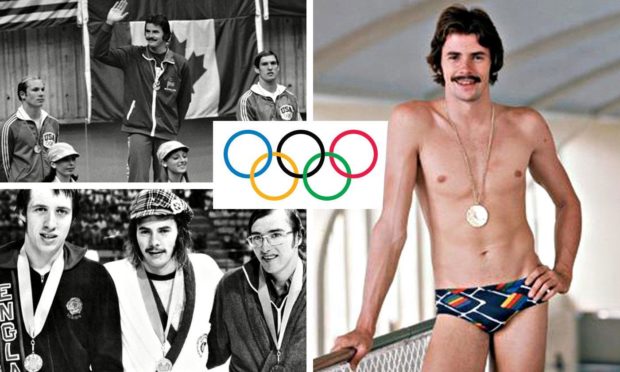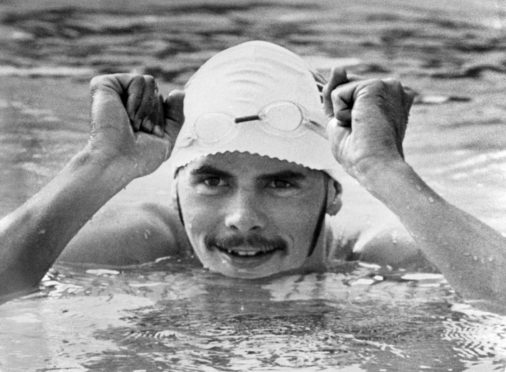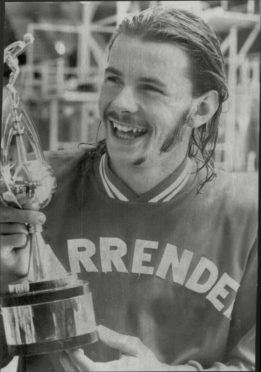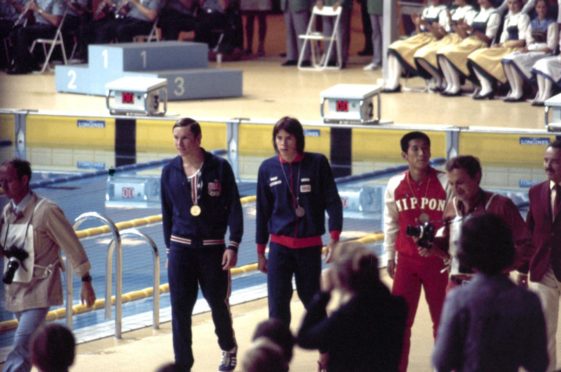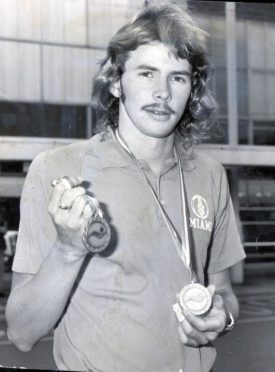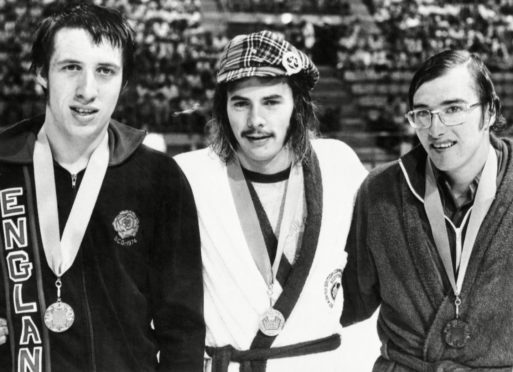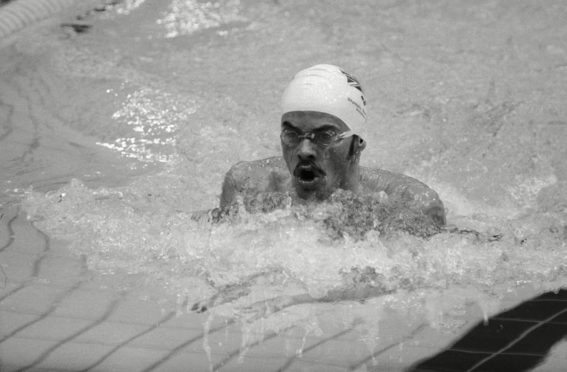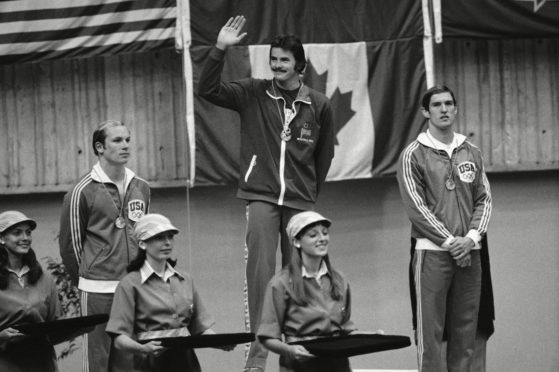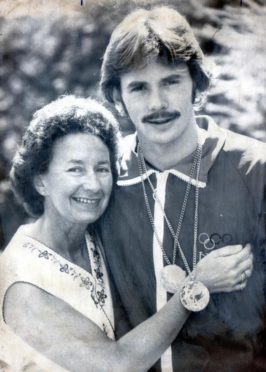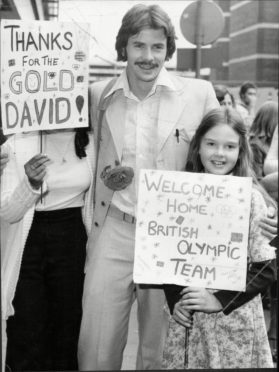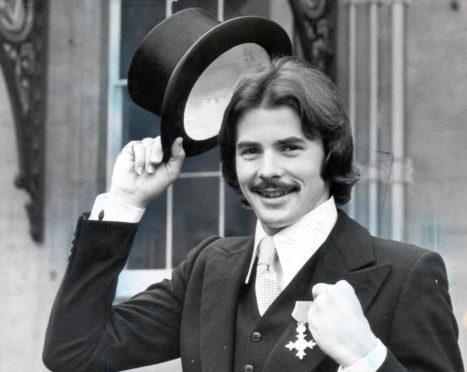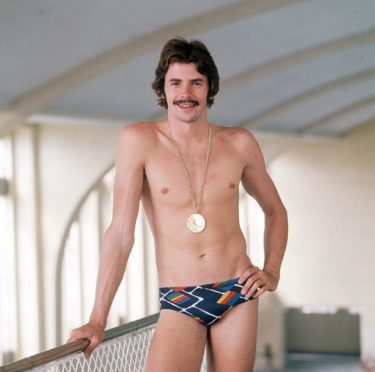“He said he’d do it and he did!”, exclaimed the family of Aberdeen Olympic swimming champion David Wilkie when he clinched gold at Montreal in 1976.
Crowding round a television back at David’s parents’ home in Aberdeen, his aunts, uncles and cousins had no doubt David would strike gold.
In fact, his auntie Betty Furneaux admitted the celebratory champagne had been chilling since the previous week.
Their faith was well-placed, because David had already enjoyed a taste of Commonwealth and Olympic success.
But 1976 was undoubtedly his finest hour: not only did he win Aberdeen’s first Olympic gold medal, he also broke a world record for breaststroke that would remain unbeaten for six years.
David swam like a fish
David’s Aberdonian parents were stationed in Colombo, Sri Lanka, where he was born in 1954.
He first learned to swim at an outdoor pool there, and his uncle Jim Furneaux joked that David’s success was down to being “thrown in the pool at two months old”.
Although a slight exaggeration, the encouragement David and older sister Caroline received in the water meant he was “swimming like a fish” by the time he could walk on land.
And as a child, he was no stranger to Aberdeen’s Bon Accord Baths whenever his family returned to their home city for holidays.
Aged 11, David was sent back to Scotland full time as a boarding pupil at Daniel Stewart’s College in Edinburgh.
And after joining the city’s renowned Warrender Baths Club, he began intensive coaching and developed his winning breaststroke technique.
His hard work under coach Frank Thomas paid off, and in 1969 he represented Britain for the first time internationally.
Record breaker
In 1970 he began to make a name for himself on the world stage.
He broke the British record for 200-metre breaststroke and went on to win his first medal at that year’s Commonwealth Games in Edinburgh.
David took bronze in the 200m breaststroke and broke the record he had set in July.
And despite being ranked 25th in the world, David won a silver medal for 200m breaststroke at the 1972 Olympic Games in Munich – breaking Scottish swimming records along the way.
In 1973, at the age of 18, David said farewell to his parents at their Viewfield Road home in Aberdeen, and embarked on a swimming scholarship at the University of Miami, America.
But he continued to swim for Scotland, and was that year awarded the prestigious Usher-Vaux Scottish Sportsman of the Year award.
It was an accolade previously won by ‘Flying Scot’ Formula 1 world champion Jackie Stewart.
1973 also saw David break the world record when he won the 200m breaststroke event at the World Championships in Yugoslavia.
The medals kept on coming in 1974 when he clinched two golds and a silver in breaststroke and medley contests at the Commonwealth Games in New Zealand.
The proud Scot sported a tartan hat given to him by a supporter as he received a “thunderous ovation for his courageous performance in winning two of the hardest swimming championships in one day”.
David struck gold in Canada
David’s golden hour came in 1976 at the Summer Olympics in Montreal.
Having upped his training regime at university, the 22-year-old was poised for glory.
With his parents Jean and Harry in the crowd, and family watching at home with bated breath, David entered the water wearing his lucky mascot tartan tammy hat.
His relatives in Aberdeen were nervous, they knew he had the ability, but a bad start could throw him off.
Swapping his tammy for his trademark swimming cap, the Press and Journal reported how David “started perfectly”.
When he “surged ahead at the 125m mark, millions let out sighs of relief knowing that he was as good as ‘home’ if not dry”.
David did it.
Scooping the gold medal for the 200m breaststroke, he was the first British male swimmer to win Olympic gold for 68 years.
David also shaved three seconds off the previous world record time – a record that stood for six years.
And his stunning victory also prevented an American clean sweep at the Olympics that year; of the 13 male swimming events, the Americans won 12 of them.
He also added to his Olympic medal tally with a silver in the 100m breaststroke.
Celebrations continued into the night in both Montreal and Aberdeen, with Lord Provost R Lennox saying “we recognise the great service he has done to sport, the country and the city”.
A hero’s welcome
Fresh from striking gold in Montreal, David received a hero’s welcome on his brief return to Aberdeen in August 1976 and declared “this is my home”.
And the city got behind its first Olympic champion.
One bar promised Aberdonians a taste of Olympic success with a special cocktail to mark the occasion: the Wilkie Gold.
Palm Court Hotel bar manager Arthur Bruce and barman Bob Wishart came up with the concoction and promised the golden treat was one that everyone could enjoy “without training first”.
The advert said: “All the exertion will be done by the barmen who shake the cocktail (it must not be stirred), and the only energy the customer needs to expend is in lifting the drink to their lips”.
For the bargain price of 60p, a Wilkie Gold was a potent combination of Canadian Club, tequila, apricot brandy and sweet martini mixed with egg white and ice.
Given David’s short stopover in the Granite City ahead of another swimming competition, it’s unlikely he made it to the Palm Court to sample the special beverage.
But the honours didn’t end there, in 1977 he was made an MBE for services to swimming and in 1982 was inducted into the International Swimming Hall of Fame.
As well as being celebrated as one of Scotland’s most successful swimmers, David is also credited with being the first swimmer to wear a swim cap and goggles in a competition to improve streamlining.
Having reached the pinnacle of his sport with Olympic glory, David retired from competitive swimming.
David has remained active in the field of swimming, developing aids and technology to advance the sport, as well as encouraging future champions.
But to this day, David Wilkie continues to be the only person to have held British, American, Commonwealth, European, world and Olympic swimming titles at the same time.
See more like this:
